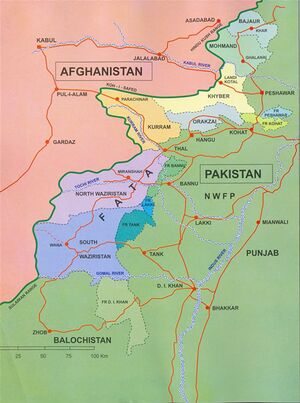Landi Kotal
| Author:Laxman Burdak, IFS (R) |

Landi Kotal (Urdu: لنڈی کوتل ) is a small town of the Federally Administered Tribal Areas of Pakistan.
Location
Landi Kotal is at the western edge of the Khyber Pass that traditionally marks the entrance to Afghanistan. It is the highest point along the pass. It is located at 34°6'4N 71°8'44E and lies on the Khyber Pass in the Khyber Agency. At 1,072 metres above sea level, it is the headquarters of the agency administration of Khyber and is on the route across the mountains from Kabul to Peshawar.[1]
Landi Kotal is a tourist destination due to historic Khyber Pass. It is accessible by road from elsewhere in Pakistan, or from the Afghanistan border just five kilometers to the west.
History
V. S. Agrawala[2] mentions Ayudhajivi Sanghas in the Ganapatha, which includes Aśani and Kārsāpaṇa: We find corresponding Pathan tribes Shinwari and Karshabun, belonging to the same stock (Imp. Gaz., NWFP, p.79). The preservation of caste system, and the sanctity of cow among the Shins, settled in the eastern Hindukush region, north of Landi Kotal, point to their former religion being Hinduism. The mountain villages where Shins are in majority retain a trace of former idolatry in the sacred stones set up in one form or another, in almost every hamlet (Afghanistan Gaz.p49). The change in religion has not yet brought about the seclusion of Shin women, who mix freely with men on all occasions, a survival of their days of freedom.
Landi Kotal was the westernmost part of the Khyber held by the British during their rule of the subcontinent. The Kotal or pass crosses a small subsidiary watershed 36000 feet above see level and thence descends to the frontier of Afghanistan near Landi Khana. In 1897 the Afridis attacked Landi Kotal and other posts in the Khyber Pass. [3]
The Uttarajyotika seems to have been the same as Landikotala, Vrindataka as Burindu and Attuck and Dvarpala as the Khybar.[4]
Tribes
Landi Kotal is the main shopping centre for both the Shinwari and Afridi tribes.
References
Back to Jat Places in Pakistan

